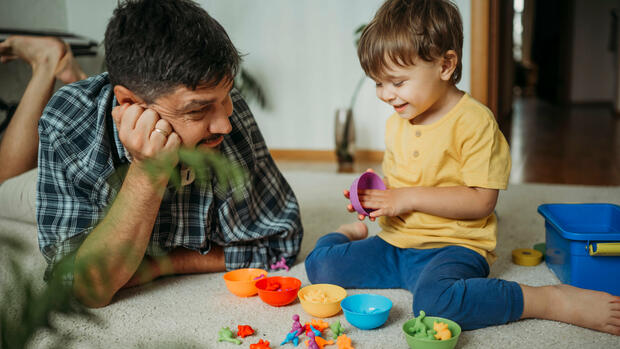Berlin The model of the sole breadwinner is the ideal for fewer and fewer fathers. This is the result of the “Fathers’ Report 2023”, which Family Minister Lisa Paus (Greens) published on Monday.
Accordingly, fathers want a division of tasks in the family organized as partners much more than before. Every second father would like to take on half of the childcare. However, only one in five actually puts this into practice.
Minister Paus sums up that in the partnership “for most fathers there is still a gap between the division of tasks that they want and the division of tasks that they actually live.” The fathers’ report itself says: “The gap between desire and Reality shows that there is potential for more partnership.”
There appears to be a gap between desire and reality when it comes to companies’ father-friendliness: 52 percent of companies with at least ten employees are of the opinion that their managers are credibly committed to helping fathers combine work and family life. However, among working fathers as a whole, only one in five fully agrees with this statement.
The Fathers’ Report describes the life situations, values and attitudes of fathers in Germany on the basis of official statistics, scientific studies and representative population surveys. For a long time, fathers were not the focus of family policy. In 2018, the ministry presented the first father report.
Fathers complain about “lack of courage”
Currently, half of men cite “lack of courage” as the reason they spend too little time with their children. 29 percent of working fathers say they are “very busy” at work. Loss of income is also discussed – but also by fathers with high household incomes.
Traditional role models are also still widespread: almost half of fathers with children under the age of six think it is important that women take a break from their careers for a while to look after childcare and that children in the first years of life are primarily looked after by their mother. A third of fathers think the traditional division of tasks – the man goes to work and the woman takes care of the household – is best.
After all, the report confirms that the economy is showing “increasing family awareness”. With the “changing role of fathers, the increasing use of parental leave and the increasing shortage of skilled workers”, fathers have become the focus of company personnel policy.
This is also based on the fact that, according to a projection by Prognos, more than 1.7 million fathers at least sometimes think about changing their employer in order to be able to better combine work and family.
Specifically, fathers are still predominantly employed full-time, namely 86 percent. Only eight percent work part-time. The Fathers Report sees “potential for optimization” here: Part-time work among male managers is only common in one in five companies.
Fathers could receive parental allowance even less frequently in the future
According to Minister Paus, parental allowance and the expansion of childcare in particular support a shared division of tasks – “at least to some extent”, as the Green politician restricts.
According to the Fathers’ Report, 44 percent of fathers recently received parental allowance, compared to 98 percent of mothers. The majority of men only take up the minimum period of two months, the so-called partner months. In 2022, the expected duration of fathers’ receipt of parental allowance was 3.6 months.
In the future, the number of fathers receiving parental allowance is likely to fall because income limits are being lowered.
(Photo: dpa)
The balance sheet here could be even worse in the future. Paus has just decided to lower the income limit up to which you are entitled to parental allowance. In this way, she wants to close a gap in the federal budget.
The family start time law announced by Paus is still pending. A mother’s partner should be given the opportunity to be released from work for ten days with full wage compensation after the birth of a child. As with maternity leave, the costs for this should be borne by employers.
A corresponding draft bill from the Ministry of Family Affairs had already been put to the departmental vote in the spring. However, nothing has happened since then. The law for “special leave” was actually supposed to come into force at the beginning of 2024.
New maintenance law as an incentive
According to the report, separation and divorce are also part of the “reality of family and parenthood”. According to the Ministry of Justice, around a quarter of all minor children in Germany have parents who live separately.
Last year there were 239,000 single fathers and over 1.3 million single mothers in Germany. But even if the children no longer live in the father’s household, contact with them remains for the majority of fathers: at 62 percent, most fathers have contact with their children several times a week or even daily.
The reform of maintenance law planned by Justice Minister Marco Buschmann (FDP) could lead to changes here in the future. Parents who contribute more than 29 percent and less than 50 percent to caring for their children should have to pay less maintenance. Since these are usually fathers, the reform is intended to create incentives for more participation by men.
More: Paus names rates for basic child security
